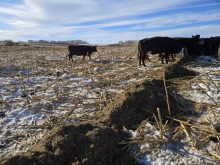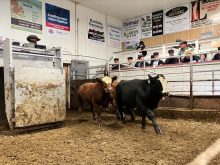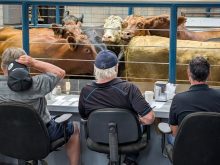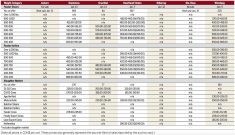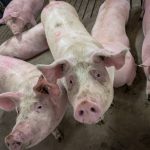Proposal calls for a new, non-profit corporation with seven elected members to take over former federally managed community pastures
The federal government is pulling out, but a new boss is taking up the reins.
A steering committee for the Association of Manitoba Community Pastures, a new not-for-profit group, has developed a business plan for taking over the operation of a million acres of formerly federally managed grazing rangelands in the province.
That’s good news, the general manager of the Manitoba Beef Producers said at last week’s District 12 meeting.
“What does this mean for you? First off, and most importantly, there are going to be no changes to the 2013 grazing season,” said Cam Dahl.
Read Also

Horse live export ban on back burner
Animal welfare groups still hope Canada’s Parliament will ban the export of live horses for slaughter, a topic back in the news due to a recent court case in Manitoba.
The federal Agro-Environment Services Branch will work the the new association in the coming year. By the end of next year, the association aims to have all land leases on the provincially and municipally owned lands transferred over to it, along with all existing inventory such as buildings, fences, and corrals, at no cost. The group will also seek a transition payment from Agriculture and Agri-Food Canada to provide “seed money” and put in place an employee retention plan.
The proposed business plan will see the group take over management of all 10 pastures in the province before the 2014 grazing season begins. The association is also in talks to manage the two pastures that straddle the Manitoba and Saskatchewan border, Spy Hill-Ellice and Cote-San Clara.
The non-profit group intends to run the pastures in much the same way as Ottawa did, but with the federal government no longer available to cover financial losses, it will need to operate on a 100 per cent cost recovery basis. And that will mean higher costs. Pasture fees will rise from the current 45 cents per cow per day, plus $25 per accompanying calf, to 60 cents per day and $30 per calf.
“One of the responses to BSE was a freeze on stocking fees, but of course that can’t last forever,” said Dahl, adding Agriculture Canada is planning to hike rates to 55 cents/day for the 2013 season.
In comparison, Saskatchewan provincial pastures are planning to charge 66 cents per day next year, he said.
The current bull program will be phased out over three years, and patrons will be able to supply their own bulls instead. Those with no bulls of their own will be able to rent bulls for the season.
Other uses of the land, such as hunting, timber production, and recreational use, will continue as before.
Association of Manitoba Community Pastures was formed after Manitoba Beef Producers rounded up an 11-member steering committee made up of pasture managers along with MAFRI and AAFC reps to develop a business plan.
“Our role has been to facilitate the development of alternative management,” said Dahl. “This new association is going to be a separate organization, not a division of the Manitoba Beef Producers.”
Once its business plan is approved by the province, the association will form a non-profit corporation with seven members and one non-voting seat reserved for MAFRI.
Board representatives will be elected by patrons at biennial grazing association meetings, with the first election set for the spring of 2013, conditional on approval of the plan for divestiture in 2014.
“Basically, we’re hoping that they will be run the way they are now,” said Kim Crandall, a Manitoba Beef Producers director who was on the steering committee.
Once elected, directors will set annual grazing fees, approve operating budgets as presented by land managers, and set stocking rates in co-operation with MAFRI staff.
Under the proposed business plan, the new association would reimburse the province to cover the cost of pasture employees, but will be in charge of hiring staff.
Pasture fees will cover operating costs and pay municipal taxes, and an application will be made for the School Tax Rebate.
Dahl said that some loose ends will need to be tied up before the transition, and his group is currently seeking feedback from ranchers.





